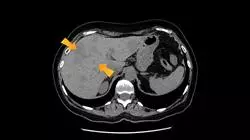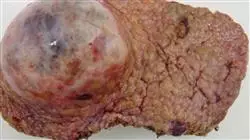University certificate
The world's largest faculty of medicine”
Introduction to the Program
Master the diagnosis and symptomatology of the different types of viral hepatitis and delve into the pathology of liver cancer with the expert teachers of this Postgraduate diploma”

Viral hepatitis is considered one of the world's major public health problems. It is a liver infection that can be caused by 6 different viruses (A, B, C, D, E and G). The causative agents differ in biological, immunological, pathological and epidemiological characteristics. It is believed that about 70 million people in the world are infected with HCV. In Spain alone, for example, 1% of the population (475,000 people) have hepatitis C, being the most frequent cause of chronic liver disease and indication for liver transplantation.
On the other hand, liver cancer is a cancer that begins in the liver cells and can be of several types, the most common being hepatocellular carcinoma, which begins in the main type of liver cell (hepatocyte). Other less common types of liver cancer are intrahepatic cholangiocarcinoma or hepatoblastoma. In this regard, cancer that spreads to the liver is more common than cancer that begins in liver cells. One that starts in another area of the body, such as the colon, lung or breast, and then spreads to the liver, is called metastatic cancer rather than liver cancer.
Given the seriousness and due to the significant number of individuals suffering from these pathologies, it is essential that the specialist can respond adequately to the evolution of these events through an adequate update of their knowledge and the incorporation of these advances in their daily medical practice, which is why TECH has developed this comprehensive program in response to a specialty in demand.
In addition, it is a 100% online Specialist Diploma that provides the student with the ease of being able to study it comfortably, wherever and whenever he/she wants. All you need is a device with internet access to take your career one step further. A modality in line with the current times with all the guarantees to position the medical professional in a highly demanded field..
You will look into the main laboratory techniques used in basic research and their use in hepatology”
This Postgraduate diploma in Viral Hepatitis and Liver Cancer contains the most complete and up-to-date educational program on the market. The most important features include:
- More than 80 clinical cases presented by experts in the different specialties. The graphic, schematic, and eminently practical contents with which they are created, provide scientific and practical information on the disciplines that are essential for professional practice
- New diagnoses and treatments for different hepatic pathologies
- Practical workshops on procedures, diagnosis and treatment techniques
- An algorithm-based interactive learning system for decision-making in the clinical situations presented throughout the course
- With a special emphasis on evidence-based medicine and research methodologies in the field of hepatology
- All of this will be complemented by theoretical lessons, questions to the expert, debate forums on controversial topics, and individual reflection assignments
- Availability of content from any fixed or portable device with internet connection
In this Postgraduate diploma you will learn about the clinical manifestations, diagnosis and therapeutics of systemic liver diseases with hepatic involvement”
The program’s teaching staff includes professionals from the sector who contribute their work experience to this training program, as well as renowned specialists from leading societies and prestigious universities.
The multimedia content, developed with the latest educational technology, will provide the professional with situated and contextual learning, i.e., a simulated environment that will provide immersive training programmed to train in real situations.
The design of this Program focuses on Problem-Based Learning, by means of which the professional will have to try to solve the different situations of Professional Practice, which will be posed throughout the Program. For this purpose, the professional will be assisted by an innovative interactive video system created by renowned and experienced experts.
Thanks to this program, you will identify steatosis and non-alcoholic steatohepatitis, their risk factors and diagnosis with safety and rigor”

Study this Postgraduate diploma in Viral Hepatitis and Liver Cancer where, when and how you want. It is 100% online!”
Why study at TECH?
TECH is the world’s largest online university. With an impressive catalog of more than 14,000 university programs available in 11 languages, it is positioned as a leader in employability, with a 99% job placement rate. In addition, it relies on an enormous faculty of more than 6,000 professors of the highest international renown.

Study at the world's largest online university and guarantee your professional success. The future starts at TECH”
The world’s best online university according to FORBES
The prestigious Forbes magazine, specialized in business and finance, has highlighted TECH as “the world's best online university” This is what they have recently stated in an article in their digital edition in which they echo the success story of this institution, “thanks to the academic offer it provides, the selection of its teaching staff, and an innovative learning method aimed at educating the professionals of the future”
A revolutionary study method, a cutting-edge faculty and a practical focus: the key to TECH's success.
The most complete study plans on the university scene
TECH offers the most complete study plans on the university scene, with syllabuses that cover fundamental concepts and, at the same time, the main scientific advances in their specific scientific areas. In addition, these programs are continuously being updated to guarantee students the academic vanguard and the most in-demand professional skills. In this way, the university's qualifications provide its graduates with a significant advantage to propel their careers to success.
TECH offers the most comprehensive and intensive study plans on the current university scene.
A world-class teaching staff
TECH's teaching staff is made up of more than 6,000 professors with the highest international recognition. Professors, researchers and top executives of multinational companies, including Isaiah Covington, performance coach of the Boston Celtics; Magda Romanska, principal investigator at Harvard MetaLAB; Ignacio Wistumba, chairman of the department of translational molecular pathology at MD Anderson Cancer Center; and D.W. Pine, creative director of TIME magazine, among others.
Internationally renowned experts, specialized in different branches of Health, Technology, Communication and Business, form part of the TECH faculty.
A unique learning method
TECH is the first university to use Relearning in all its programs. It is the best online learning methodology, accredited with international teaching quality certifications, provided by prestigious educational agencies. In addition, this disruptive educational model is complemented with the “Case Method”, thereby setting up a unique online teaching strategy. Innovative teaching resources are also implemented, including detailed videos, infographics and interactive summaries.
TECH combines Relearning and the Case Method in all its university programs to guarantee excellent theoretical and practical learning, studying whenever and wherever you want.
The world's largest online university
TECH is the world’s largest online university. We are the largest educational institution, with the best and widest online educational catalog, one hundred percent online and covering the vast majority of areas of knowledge. We offer a large selection of our own degrees and accredited online undergraduate and postgraduate degrees. In total, more than 14,000 university degrees, in eleven different languages, make us the largest educational largest in the world.
TECH has the world's most extensive catalog of academic and official programs, available in more than 11 languages.
Google Premier Partner
The American technology giant has awarded TECH the Google Google Premier Partner badge. This award, which is only available to 3% of the world's companies, highlights the efficient, flexible and tailored experience that this university provides to students. The recognition as a Google Premier Partner not only accredits the maximum rigor, performance and investment in TECH's digital infrastructures, but also places this university as one of the world's leading technology companies.
Google has positioned TECH in the top 3% of the world's most important technology companies by awarding it its Google Premier Partner badge.
The official online university of the NBA
TECH is the official online university of the NBA. Thanks to our agreement with the biggest league in basketball, we offer our students exclusive university programs, as well as a wide variety of educational resources focused on the business of the league and other areas of the sports industry. Each program is made up of a uniquely designed syllabus and features exceptional guest hosts: professionals with a distinguished sports background who will offer their expertise on the most relevant topics.
TECH has been selected by the NBA, the world's top basketball league, as its official online university.
The top-rated university by its students
Students have positioned TECH as the world's top-rated university on the main review websites, with a highest rating of 4.9 out of 5, obtained from more than 1,000 reviews. These results consolidate TECH as the benchmark university institution at an international level, reflecting the excellence and positive impact of its educational model.” reflecting the excellence and positive impact of its educational model.”
TECH is the world’s top-rated university by its students.
Leaders in employability
TECH has managed to become the leading university in employability. 99% of its students obtain jobs in the academic field they have studied, within one year of completing any of the university's programs. A similar number achieve immediate career enhancement. All this thanks to a study methodology that bases its effectiveness on the acquisition of practical skills, which are absolutely necessary for professional development.
99% of TECH graduates find a job within a year of completing their studies.
Postgraduate Diploma in Viral Hepatitis and Liver Cancer
Liver cancer and viral hepatitis are one of the major public health concerns worldwide, with liver cancer being the fifth most frequent and hepatitis C the most common risk factor. Therefore, in this specialized program of Postgraduate Diploma in Viral Hepatitis and Liver Cancer, the knowledge of these pathologies, their causes, diagnosis and treatment is deepened.Medical professionals must be prepared to face these challenges, and for this it is necessary for them to have specialized training. In this program, the student will learn everything necessary to understand the problems of these diseases, as well as the most advanced tools and techniques for their treatment.Viral hepatitis is a disease that can be prevented and treated. On the other hand, liver cancer is one of the most aggressive forms of cancer and its early diagnosis is essential for better patient survival. This program addresses the role of prevention in these pathologies, as well as early diagnosis and comprehensive patient care.
Update your knowledge in liver pathologies
The preparation of an expert in viral hepatitis and liver cancer is not only important for the medical professional, but also has a significant impact on society. By improving the knowledge and treatment of these pathologies, it is possible to prevent contagion and improve the quality of life of those affected.In short, the Postgraduate Diploma in Viral Hepatitis and Liver Cancer is a specialized and comprehensive program that offers the medical professional the knowledge and tools necessary to deal effectively with these pathologies. An essential specialization in the context of global public health.







